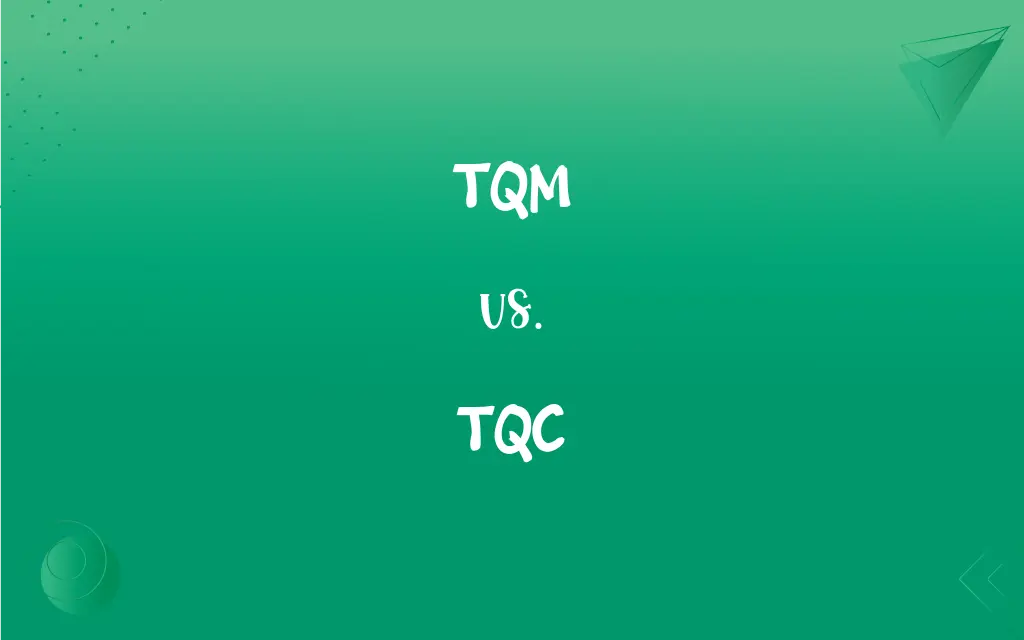TQM vs. TQC: What's the Difference?
Edited by Aimie Carlson || By Harlon Moss || Published on February 4, 2024
TQM (Total Quality Management) is an organization-wide approach focusing on continuous improvement in all aspects, while TQC (Total Quality Control) is a more focused approach emphasizing quality control in production processes.

Key Differences
TQM, or Total Quality Management, is a holistic approach to long-term success through customer satisfaction, involving all members of an organization in improving processes, products, and services. TQC, or Total Quality Control, specifically focuses on controlling the quality of products and services through consistent production processes.
In TQM, the emphasis is on a company-wide culture change, fostering a commitment to quality in every department and at every level. TQC, in contrast, primarily targets the manufacturing and production sectors, concentrating on identifying and reducing errors in the production line.
TQM integrates the principles of quality management into the overall business strategy and encompasses areas like process management, customer relations, and employee training. TQC, however, is more concerned with the technical aspects of quality control, such as inspection, testing, and compliance with standards.
TQM requires involvement and commitment from top management to the front-line employee, while TQC often involves specific teams like quality control departments, focusing on meeting quality standards in products and services.
Comparison Chart
Focus
Organization-wide continuous improvement
Quality control in production
ADVERTISEMENT
Scope
All departments and levels
Mainly manufacturing and production
Strategy
Integrates quality into business strategy
Concentrates on technical quality aspects
Participation
Involves entire organization
Often involves specific teams or departments
Objective
Long-term customer satisfaction
Consistency and error reduction in production
TQM and TQC Definitions
TQM
TQM fosters a culture of teamwork, open communication, and continuous learning.
Through TQM training programs, employees developed a shared commitment to quality excellence.
ADVERTISEMENT
TQC
Often the responsibility of specific quality control departments.
The TQC department played a key role in maintaining production standards.
TQM
An organizational strategy focusing on continuous improvement in all aspects.
The company adopted TQM to enhance customer satisfaction.
TQC
Focuses on controlling product and service quality in production processes.
TQC was implemented to reduce errors in the manufacturing line.
TQM
Involves every department and level in the quality management process.
TQM transformed the company's approach to employee training.
TQC
Involves techniques like inspection and testing for quality assurance.
The company's TQC system included rigorous product testing.
TQM
Aims for long-term success through customer satisfaction.
TQM practices led to significant improvements in product quality.
TQC
Targets consistent quality and error reduction in production.
TQC measures improved the overall quality of the final products.
TQM
Encourages a culture change towards commitment to quality.
Under TQM, the company focused on process efficiency and quality.
TQC
TQC is essential for industries where precise quality control and reliability are paramount.
The aerospace industry relies on TQC to ensure the safety and reliability of aircraft components.
FAQs
How does TQM differ from TQC in scope?
TQM involves the entire organization, while TQC focuses mainly on production.
What is Total Quality Management (TQM)?
A comprehensive organizational strategy focusing on continuous improvement in all aspects.
What does Total Quality Control (TQC) emphasize?
TQC emphasizes quality control in the production process.
Does TQM involve employee training?
Yes, TQM typically includes comprehensive employee training.
What role do managers play in TQM?
Managers play a crucial role in leading and implementing TQM strategies.
Can TQC exist without TQM?
Yes, TQC can be implemented independently of a broader TQM strategy.
How does TQM affect long-term business strategy?
TQM integrates quality into the core business strategy for long-term success.
How does TQC impact product quality?
TQC aims to improve product quality by reducing errors and ensuring consistency.
Is TQM limited to manufacturing industries?
No, TQM is applicable across all types of industries.
Are customer relations part of TQM?
Yes, TQM emphasizes customer satisfaction and relations.
Does TQM require a culture change?
Yes, TQM often involves a shift in organizational culture towards quality at all levels.
What tools are used in TQC?
TQC uses tools like statistical process control, inspections, and testing.
Can TQC improve efficiency in production?
Yes, by focusing on error reduction and process consistency.
Is customer feedback important in TQM?
Yes, customer feedback is a critical component of TQM.
Is TQC mainly the responsibility of quality control departments?
Yes, TQC often involves specific teams or departments focused on quality control.
Can TQM improve a company’s competitive edge?
Yes, TQM can enhance overall performance and customer satisfaction, improving competitiveness.
How do employees contribute to TQM?
Employees at all levels contribute to continuous improvement in TQM.
Does TQC involve process management?
Yes, it involves managing and controlling production processes for quality.
Does TQM involve quality control measures?
Yes, but within a broader framework that includes all organizational aspects.
Are TQC practices specific to certain industries?
While applicable to many industries, TQC is particularly important in manufacturing.
About Author
Written by
Harlon MossHarlon is a seasoned quality moderator and accomplished content writer for Difference Wiki. An alumnus of the prestigious University of California, he earned his degree in Computer Science. Leveraging his academic background, Harlon brings a meticulous and informed perspective to his work, ensuring content accuracy and excellence.
Edited by
Aimie CarlsonAimie Carlson, holding a master's degree in English literature, is a fervent English language enthusiast. She lends her writing talents to Difference Wiki, a prominent website that specializes in comparisons, offering readers insightful analyses that both captivate and inform.































































